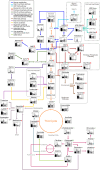Fruit-specific overexpression of lipoyl synthase increases both bound and unbound lipoic acid and alters the metabolome of tomato fruits
- PMID: 40458214
- PMCID: PMC12127388
- DOI: 10.3389/fpls.2025.1545011
Fruit-specific overexpression of lipoyl synthase increases both bound and unbound lipoic acid and alters the metabolome of tomato fruits
Abstract
Introduction: Lipoic acid (LA) is a key, yet overlooked player in primary metabolism, due to its role as a cofactor for various multi enzymatic complexes such as the E2 subunits of pyruvate dehydrogenase (PDH) and alpha-ketoglutarate dehydrogenase (kGDH). In recent years, this molecule has seen renewed interest given its strong antioxidant properties and its applications as a dietary supplement. The mechanisms behind the synthesis of LA in vivo have been elucidated, identifying lipoyl synthase (LIP1) as the key enzyme required for this process.
Methods: Therefore, in this work, we used the fruit-specific polygalacturonase (PG) promoter to guide Solanum lycopersicum (tomato) LIP1 (SlLIP1) overexpression in stably transformed tomatoes.
Results: The resulting plants presented higher transcript levels of SlLIP1 in a fruit-specific manner, accumulated more bound and unbound LA yet lacked major phenotypic defects at both the vegetative and reproductive growth stages. Furthermore, changes in the expression of genes related to LA synthesis were explored and a metabolomic study was carried out. Specific metabolite patterns were clearly distinguishable between untransformed and stably transformed lines. For instance, trehalose 6-phosphate, GABA and proline levels were generally higher, whilst glucose 6-phosphate and UDP-glucose levels were lower in fruits of the SlLIP1 transformants.
Discussion: In addition, as the overexpression of SlLIP1 results in lower transcript levels of E2 PDH and E2 kGDH, and enhanced amounts of LA-bound targets, we speculate that the proportion of unlipoylated E2 subunits of PDH and kGDH may have decreased. This work could assist in obtaining crops with a higher LA content and therefore improved health benefits.
Keywords: Solanum lycopersicum; TCA cycle; antioxidant; lipoylation; polygalacturonase promoter.
Copyright © 2025 Covarrubias, Uribe, Arias-G, Cabedo and Handford.
Conflict of interest statement
The authors declare that the research was conducted in the absence of any commercial or financial relationships that could be construed as a potential conflict of interest.
Figures





References
-
- Ansari M. I., Jalil S. U., Ansari S. A., Hasanuzzaman M. (2021). GABA shunt: a key-player in mitigation of ROS during stress. Plant Growth Regul. 94, 131–149. doi: 10.1007/s10725-021-00710-y - DOI
-
- Araya-Flores J., Miranda S., Covarrubias M. P., Stange C., Handford M. (2020). Solanum lycopersicum (tomato) possesses mitochondrial and plastidial lipoyl synthases capable of increasing lipoylation levels when expressed in bacteria. Plant Physiol. Biochem. 151, 264–270. doi: 10.1016/j.plaphy.2020.03.031 - DOI - PubMed
LinkOut - more resources
Full Text Sources

